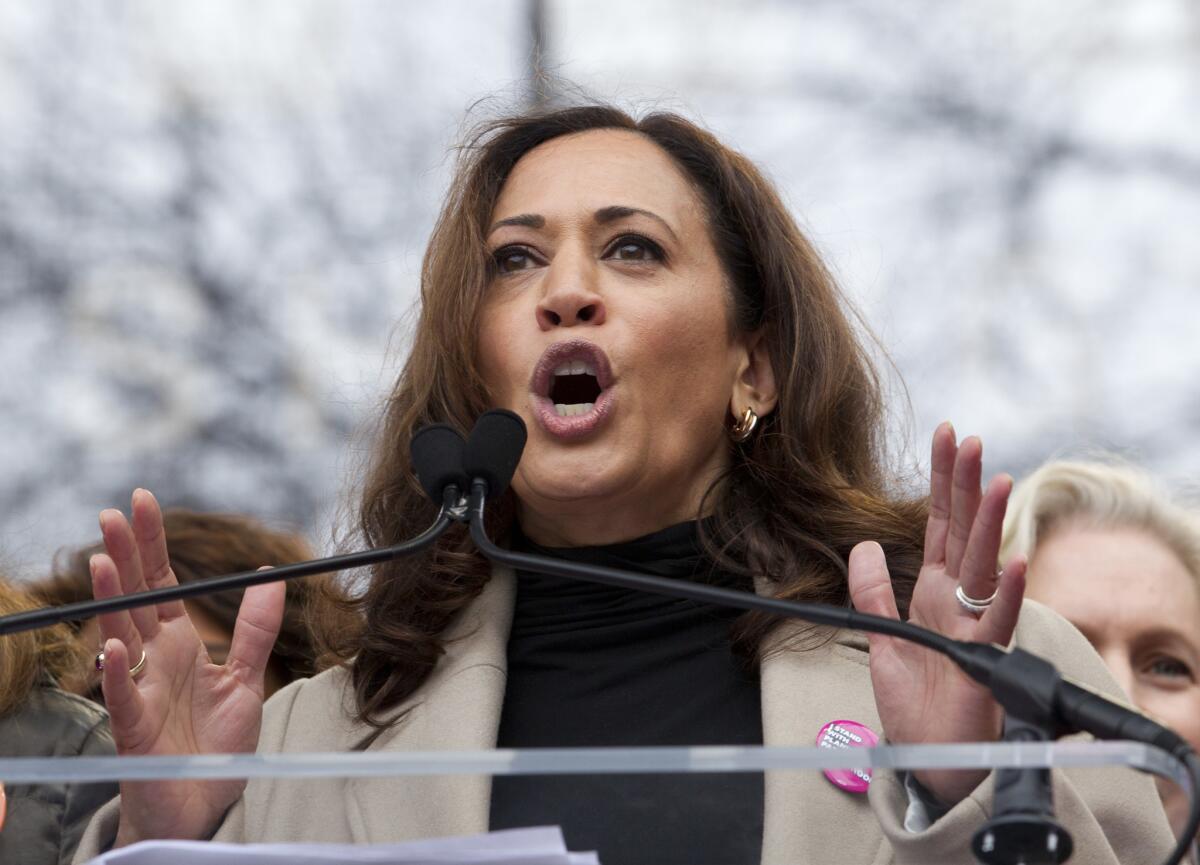On Politics: A Californian for president in 2020? It could happen

- Share via
Kamala Harris hadn’t even arrived in Washington to take up her job as California’s spanking-new U.S. senator when the chatter began: Kamala for president!
Never mind her disavowals — “Seriously?” — or the fact that the first balloting of the 2020 race is, at a minimum, 1,000-plus days away. The soul-sapping election of Donald Trump has Democrats desperately looking far, far down the road.
“Usually the candidates start sending signals,” said Jim Demers, a longtime party strategist in New Hampshire, the state that traditionally holds the first presidential primary. “This time I’m hearing activists begging for the race to begin.”
With a wide-open contest (read: not a Clinton or Obama in sight), the list of would-be contenders, real and imagined, is a lengthy one, even by the prodigious standards of this early stage.
What’s different in 2020 is that California — huge in population, mighty in economic power, desperate to matter in presidential politics — figures to be at the center of speculation in a way it hasn’t for a generation.
It’s not just Harris, now almost a full month into her term, whom the mentioners are mentioning. Whoever succeeds Jerry Brown will instantly acquire, along with keys to the governor’s mansion, a spot high on the list of talked-about prospects.
“When you’re governor of California, you automatically have one of the biggest soapboxes in the country,” said Rose Kapolczynski, a Democratic strategist whose clients include Tom Steyer, the hedge-fund-billionaire-turned-environmental-crusader and possible 2018 gubernatorial candidate.
But it’s more than size.
“California is pushing the envelope of progressive issues, from climate change to worker protections to equality,” said Kapolcyznski, anticipating what Democrats may hunger for in the party’s 2020 savior-slash-standard-bearer. “That makes California’s governor very interesting.”
(Necessary aside: Any Republican born in the U.S. who were to defy steep odds and win the governorship in November 2018 would from that very moment become a leading GOP prospect in 2020 or 2024, depending on the fate of President Trump.)
It’s been a long drought, politically speaking.
California produced two Republican presidents in a 12-year span — Richard Nixon and Ronald Reagan — and plenty of politicians, powerful and otherwise, who dreamed of following in their footprints. (Former Vice President Nixon had moved to New York City by the time he won the White House in 1968, but the Orange County native remained politically rooted in California.)
The state’s last serious presidential candidate was then-Gov. Pete Wilson, who failed miserably in his bid for the 1996 GOP nomination.
Since then, California has been sidelined, save for its perennial role as cash dispenser for candidates from other places.
Democratic Gov. Gray Davis might have liked to run, but he was recalled before he had the chance. Republican Gov. Arnold Schwarzenegger wanted to run, but his Austrian birth certificate proved an insurmountable hurdle. Brown really, really wanted to run, but his age — he turns 79 in April — and political wisdom kept him on the sidelines in 2016 after three previous tries.
As for the state’s two longtime Democratic U.S. senators, Dianne Feinstein and the recently retired Barbara Boxer, neither had the inclination to seek the White House nor, to be blunt, the right gender to be taken seriously as presidential contenders. (Hillary Clinton may have lost the 2016 election, but she made it infinitely easier for the next generation of female candidates to follow.)
As California ushers in a new generation of political leaders, a higher presidential profile seems assured.
Still, whether it’s Sen. Harris or Gov. Antonio Villaraigosa, Gov. Gavin Newsom, Gov. John Chiang or some chief-executive-to-be-named-later, any one of them would bear a distinct burden should they cross the Missouri River.
“You come with either the ‘uninformed’ or ‘out-of-touch’ label,” said David Nagle, a former Iowa congressman and longtime Democratic activist in the state, whose precinct caucuses traditionally kick off the nominating process. “It’s assumed — even if it’s not true — that you don’t know anything about farming, that you don’t understand small towns, that you don’t understand rural America.”
That is hardly insurmountable; witness Chicagoan Barack Obama, whose upset victory in Iowa launched him past Clinton clear to the White House. But it’s something any Californian running for president would likely need to overcome.
First, though, the requisite expressions of disinterest.
“Sen. Harris is singularly focused on fighting for the people of California in her new role,” said Lily Adams, a spokeswoman, elaborating on the brusque dismissal Harris offered on election eve. “If the first two weeks are any indication, that’ll keep her plenty busy.”
Lt. Gov. Newsom, one of the early front-runners in the gubernatorial contest, was even more adamant.
“That seems like the most miserable job in the world,” Newsom said when asked about the presidency at a November forum hosted by Recode, the Silicon Valley news website. “Don’t even talk about it. We’re wasting valuable time.”
He might have even meant it.
For now, anyway.
Twitter: @markzbarabak
ALSO
Analysis: Trump versus California: The feud turns from rhetorical to real
Taking on Trump in his State of the State speech, Gov. Brown reminded us that he loves the limelight
More to Read
Get the L.A. Times Politics newsletter
Deeply reported insights into legislation, politics and policy from Sacramento, Washington and beyond. In your inbox twice per week.
You may occasionally receive promotional content from the Los Angeles Times.











